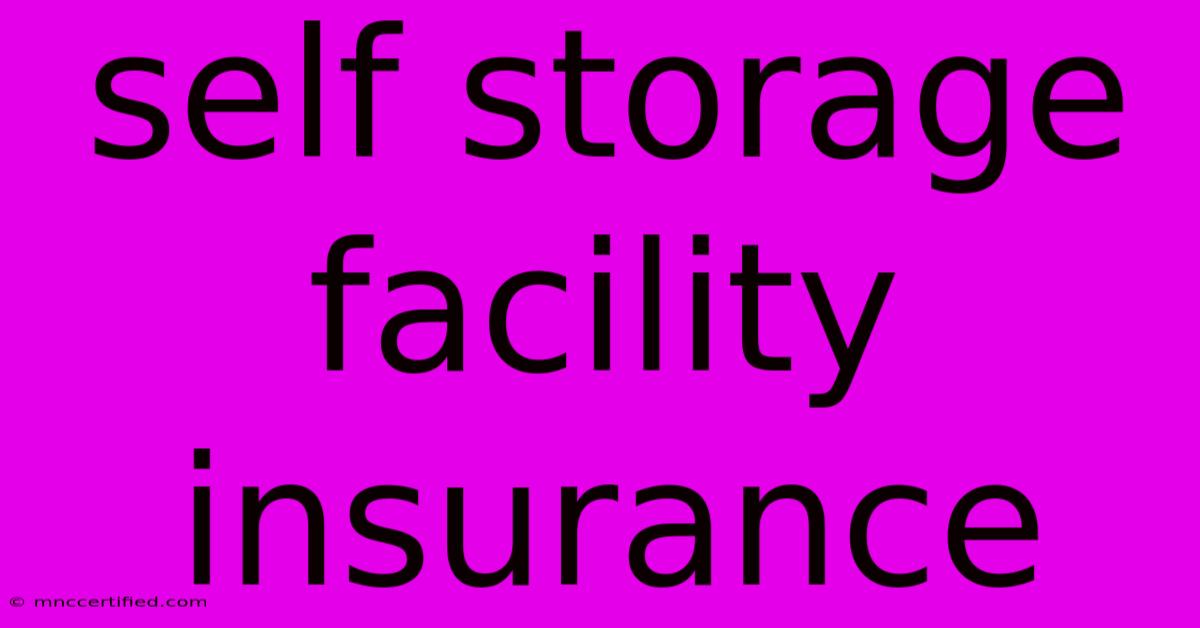Self Storage Facility Insurance

Table of Contents
Self Storage Facility Insurance: A Comprehensive Guide for Owners and Managers
Self storage facilities are a booming industry, but they also carry significant risks. From fire and theft to liability claims and natural disasters, protecting your investment requires a robust insurance strategy. This comprehensive guide will explore the essential types of insurance for self storage facilities, helping you navigate the complexities and secure the right coverage.
Understanding the Risks Faced by Self Storage Facilities
Before diving into specific insurance policies, it's crucial to understand the potential risks your facility faces. These can be broadly categorized as:
Property Risks:
- Fire: Fires, whether accidental or malicious, can cause devastating damage to your buildings, units, and the contents stored within.
- Water Damage: Leaks, floods, and burst pipes can lead to significant property damage and potential mold issues.
- Wind & Hail Damage: Severe weather can damage roofs, walls, and other structures.
- Vandalism & Theft: Break-ins and vandalism can result in property damage and the loss of stored items.
Liability Risks:
- Customer Injury: Customers could be injured on your property due to slips, falls, or other accidents.
- Property Damage: Customers' belongings might be damaged while in your care, leading to liability claims.
- Employee Injuries: Workplace accidents can result in workers' compensation claims.
Essential Insurance Policies for Self Storage Facilities
Understanding the risks allows you to choose the right insurance coverage. Here are some essential policies:
1. Commercial Property Insurance:
This is the cornerstone of your insurance strategy. It covers the physical structure of your facility, including the buildings, fences, and other improvements. Commercial property insurance typically protects against fire, wind, hail, vandalism, and other covered perils. Make sure your policy adequately covers the replacement cost of your buildings and any improvements.
2. Business Liability Insurance (General Liability):
General liability insurance protects your business from claims of bodily injury or property damage caused by your operations. This is crucial for covering customer injuries on your property, damage to customers' belongings, and advertising injury. Consider adding umbrella liability insurance for additional coverage beyond your general liability policy limits.
3. Inland Marine Insurance:
This policy covers the contents stored within your units, protecting you against losses due to fire, theft, vandalism, or other covered perils. While you don't directly insure the customer's belongings, inland marine insurance can protect your facility against potential liability claims if your negligence contributes to their loss. This is especially important if you offer additional services like moving or packing.
4. Workers' Compensation Insurance:
If you employ staff, workers' compensation insurance is mandatory in most jurisdictions. This policy covers medical expenses and lost wages for employees injured on the job.
5. Flood Insurance:
Depending on your location, flood insurance may be essential. Standard commercial property insurance policies typically exclude flood coverage, so you'll need a separate flood insurance policy if your facility is in a flood-prone area.
Additional Considerations:
- Cyber Liability Insurance: As you increasingly manage operations digitally, cyber liability insurance protects against data breaches and other cyber risks.
- Equipment Breakdown Insurance: This covers the costs of repairing or replacing essential equipment, such as HVAC systems or security systems.
- Crime Insurance: This protects against losses due to employee dishonesty, theft, and other criminal activities.
Choosing the Right Insurance Provider:
Selecting the right insurance provider involves careful comparison. Consider factors like:
- Policy coverage: Ensure the policy adequately covers your specific needs and risks.
- Premiums: Compare premiums from multiple insurers to find the best value.
- Reputation and financial stability: Choose a reputable insurer with a strong financial rating.
- Customer service: Ensure the insurer offers excellent customer support.
Don't underestimate the importance of regularly reviewing and updating your insurance policies. Your needs may change over time, requiring adjustments to your coverage. Consult with an insurance professional to ensure you have the right protection for your self storage facility.
Off-Page SEO Considerations:
To improve your article's ranking, consider these off-page SEO strategies:
- Backlinks: Reach out to relevant websites (insurance blogs, real estate sites, business publications) and request backlinks to your article.
- Social Media Promotion: Share your article on social media platforms to increase visibility and drive traffic.
- Guest Blogging: Write guest posts for other relevant websites, including a link back to your article.
- Directory Listings: List your article (and/or your business) in relevant online directories.
By following these on-page and off-page strategies, you can create a comprehensive and highly-ranked article about self storage facility insurance. Remember that consistent SEO efforts are key to long-term success.

Thank you for visiting our website wich cover about Self Storage Facility Insurance. We hope the information provided has been useful to you. Feel free to contact us if you have any questions or need further assistance. See you next time and dont miss to bookmark.
Featured Posts
-
Springboks Defeat Wales Winless Year
Nov 24, 2024
-
Greenock Born Peer Rangers Chairman
Nov 24, 2024
-
Kansas Colorado Clash At Arrowhead
Nov 24, 2024
-
Georgia Dominates U Mass Final Score
Nov 24, 2024
-
Cheapest Sr22 Insurance Georgia
Nov 24, 2024